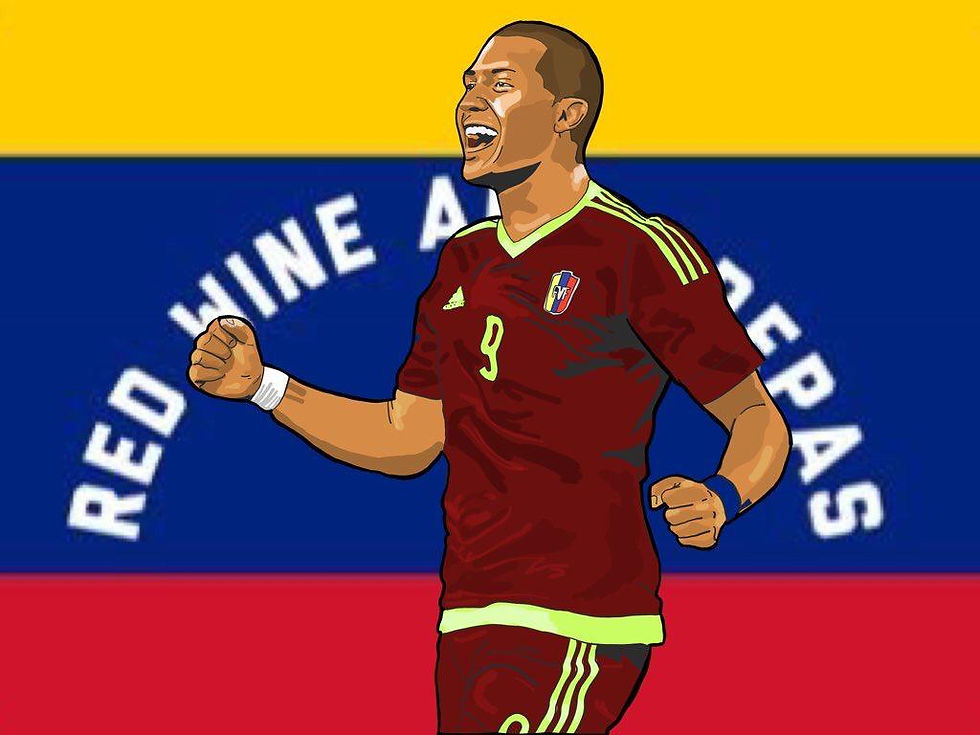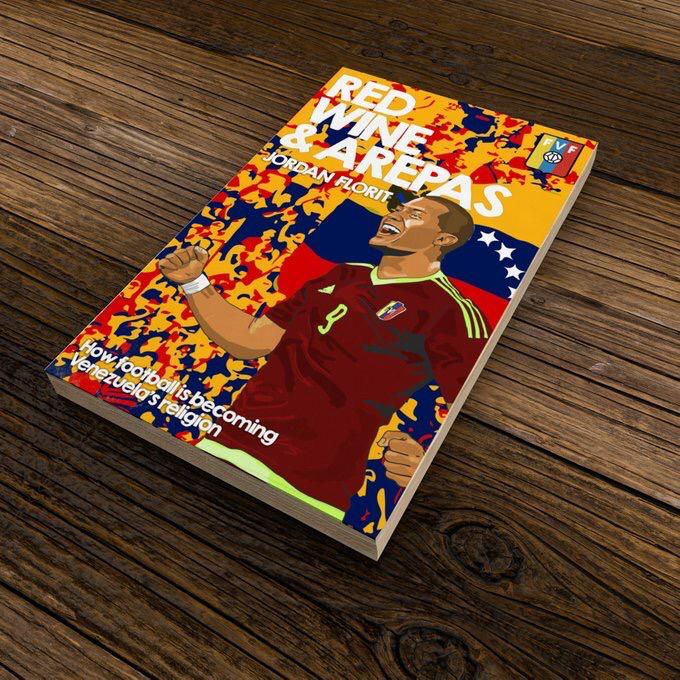Red Wine & Arepas: A book about Venezuela and football
- Katherine Sheppard

- 30 abr 2020
- 7 Min. de lectura

I remember my first official appearance with the Venezuelan national team. It was in the 2008 U-17 Sudamericano in Chile. Our first match was against, of course, the Canarinha. I was shaking while standing in the tunnel, right before stepping onto the field. Meanwhile the Brazilian girls tried to intimidate us by shouting, singing, acting like they were about to eat us alive. But once the Gloria al Bravo Pueblo started playing… everything disappeared.
I closed my eyes, it was only me and my ten other sisters singing that anthem as loud as we could. I shed a few tears. I was emotional, proud, excited, but I wasn’t scared or nervous anymore. That anthem and that jersey became my shield and my strength, and after that nothing else mattered more than defending them. Six minutes after, we were up 2-0. We couldn’t hold the advantage though, and ended up losing 2-3. It was one of the toughest losses I have experienced, but also one of the most memorable matches I have ever played.
The feelings and the significance tied to that day are what make it so memorable. Now looking back, after being away from home for more than 10 years, most of the memories from Venezuela I hold dearest involve football.
I have lived in two different countries since leaving Caracas in 2009. Whenever I mention where I’m from, the automatic reply is something like “oh yeah, Chavez/Maduro” or something directly involving the terrible political situation the country has been in for over two decades. Nothing about the culture, the people, the landscapes… or football.
That is why I am so thrilled about Red Wine & Arepas: How Football is Becoming Venezuela’s Religion by Jordan Florit. He is writing this book because he is very interested in Latin American culture and has read books about history and football in different latino countries. When he got to Venezuela though, the material available was unidimensional and only talked about politics. As many of us, he wanted more. He knew this was not the only thing that could define a country. With this book, he aims to tell a story of Venezuela through football and how the sport can reflect people's emotions, feelings, and points of view.
The Writing Journey

Jordan is a young writer from Southampton, England currently living in London with his pregnant wife and daughter. He is focusing all of his efforts on the book. "The inception of the idea consciously came to fruition in May 2019, but in earnest it started when I wrote my first article on Venezuelan football in March 2019, and even earlier in 2012 when I first started devouring books on the country". Ever since then, he started undertaking research by talking to a lot of people (including former and present professional players like Stalin Rivas and Cristian Casseres Jr., former executive president of the league Rubén Villavicencio, among others). He has been following Venezuela since 2012, the national team since 2017, and Venezuelan domestic football since 2017.
He even travelled to Venezuela as part of his research process for the book. He spent two weeks exploring Caracas, Maracay, Barinas, Mérida and Táchira. He says he feels a strong affinity to the country, in particular the people. "It is important to say that those feelings have come from all sides of the political spectrum. Whether it was from pro- or anti- government supporters, Venezuelans in or outside of the country, football fans or not, everyone has been so supportive and honest with me".
For Jordan, the trip was a lot more than just research. He took advantage of the opportunity to help a lot of people by donating five suitcases full of football gear to kids in modest communities and football schools. Seeing the reality of the country's terrible situation through the lens of people inside and out of football stirred up a lot of emotions in him. "I cried on more than one day; I had some of the best and happiest experiences of my life (...) I stayed in the houses of ordinary people, as well as in hotels and club accommodation. I hope to one day return as a tourist, without the time constraints and pressures of research. I made some friends I will have for life, none more important to me than Kevin Vivas". Kevin is a university student who was Jordan's translator, guide, driver, and ultimately became a really good friend.
Besides having to write about 3000 words on a weekly basis (sometimes more), some of the challenges he has encountered during the writing journey include "having to detach myself a little from the closeness I’ve had with aspects of the game in order to write about it objectively". The people he has met, the stories he has heard, everything was worth it. "No matter how well this book does or doesn’t do, the process has been something I will never forget".
A Learning Experience
Being in Venezuela for two weeks allowed Jordan to experience first hand how people live their day to day. "I saw some misery and hopelessness and some joy and genuine happiness, and I saw both in circumstances that were terrible and circumstances that were great".
In terms of football, he describes it as an 'affair'. Historically, domestic football has been overshadowed by the popularity of European clubs and competitions. He tells the anecdote of a taxi driver that confessed that he has never taken the Venezuelan league seriously. "Football fans in Venezuela are caught up in an mid-life love affair,” Jordan said, “in which the Venezuelan football league is their long-suffering wife, always there, familiar, and comfortable, but ultimately unable to excite; and European football, with its Premier League, La Liga, and Champions League, is the seductive and attractive mistress". The book explores this challenge and the role the national team has had so far in drawing Venezuelans into domestic football.
This project has given Jordan new insights, new experiences, and alternative ways of viewing the world and Venezuela itself. "More than ever I want to dedicate my professional life to writing anthropologically about football".
More About the Book

As described by Jordan, the approach to writing the book is threefold: interviews with professionals from within the game, research, and own experiences in Venezuela and with Venezuelans, be it directly football related or not.
His favorite interviewee so far has been Daniuska Rodriguez, a player for the Vinotinto Femenina and currently at SC Braga of Portugal. "Her personal story, her achievements in football, and how her life shows how football, politics, and society are inextricably linked is exactly why I wanted to write this book".
From the research point of view, his favorite chapter is 'The III-Fated Final', about the ending of the 2019 FutVe season. "There were so many subplots that overlapped and played out in those final few weeks and games. It incorporated interviews with players, managers, and fans of three different teams; the political legacy of Chávez; Cuban refugees; corruption and bribery; the oil crisis; and what work the league has done and still needs to do to be truly professional and the best it can be".
The chapter 'Montalban Tres' takes the prize as his favorite chapter from a personal standpoint. It focuses less on football. "It chronicles one night I had in Caracas in which I went back to Kevin’s flat for the night, with a few of his friends, and I spent the night listening to stories of their life, playing games, and drinking with them. It was a wonderful evening during which I learnt a lot".
Jordan was kind enough to let me read a draft of these three chapters. The storytelling and detail is amazing, inspiring, and compelling. The chapter I felt the most affinity to was Daniuska's. Her story mirrors the life of so many other young footballers and it really makes you put things into perspective. Venezuelan women's football has immense potential, and I hope someday circumstances allow more talent to break through all the obstacles just like Daniuska did.
The book talks about women in the Venezuelan football scene further. There are chapters that feature footballer Verónica Herrera and the Women's National team, as well as psychologist Alejandra Blasco, filmmaker Jennifer Socorro, and others. It will definitely be interesting to read about them through Jordan's lens.
Jordan's Take on Venezuelan Football
What do you think needs to happen for Venezuelan football to make the jump internationally and achieve that goal of winning a Copa America or qualifying for a World Cup?
I asked Jordan this question because I was interested in knowing his opinion from the outside looking in. He talks about the domestic league having to continue growing by either working in greater unison with the Venezuelan Football Federation (FVF) or becoming an independent body, like Spain's LaLiga for example.
Also, he praises the Juvenile Rule implemented in 2007 which stipulates that teams must field at least one player under the age of 20 in their starting line-up. It has helped young players develop and nurture the U17 and U20 national teams with talent.
"These measures, in tandem with allowing the league independence or being given proper support from the FVF, should ensure they continue to grow internationally. I believe the aim should be for FutVe to be in a strong enough position that it can bypass selling its best talent to Brazil, Argentina, and MLS, and instead export their best players directly to Europe".
That said, he thinks there is already talent good enough to qualify for Qatar 2022, but management needs to be up to par. He hopes Jose Peseiro can continue the momentum as much as possible and achieve the ultimate goal.
Just a Few Months Left
The 350-page long book is scheduled to be published in August 2020, with the Spanish translation following in January 2021. He decided to raise the funds for it through Kickstarter because a publishing deal would have limited the scope of the project, which has incorporated much more than just the book. His goal: raising £5,000. He reached it in two weeks and ended up raising just over £6,000.
You can preorder the book and learn more about the project here. You can also follow Jordan on Facebook and Twitter and read other pieces by him on his portfolio.

For Venezuelans like me, football fans or not, this project will represent a connection point to our country and our culture, and it will remind us of how beautiful our homeland is, despite the difficulties. For non-Venezuelans, it can be an opportunity to learn about the country and about how it is like to live there in these times, as well as learning about the role football has in our identity.
Have you read any books on football and society? Let me know in the comments. Subscribe to my blog to be notified of future articles.



Comentarios